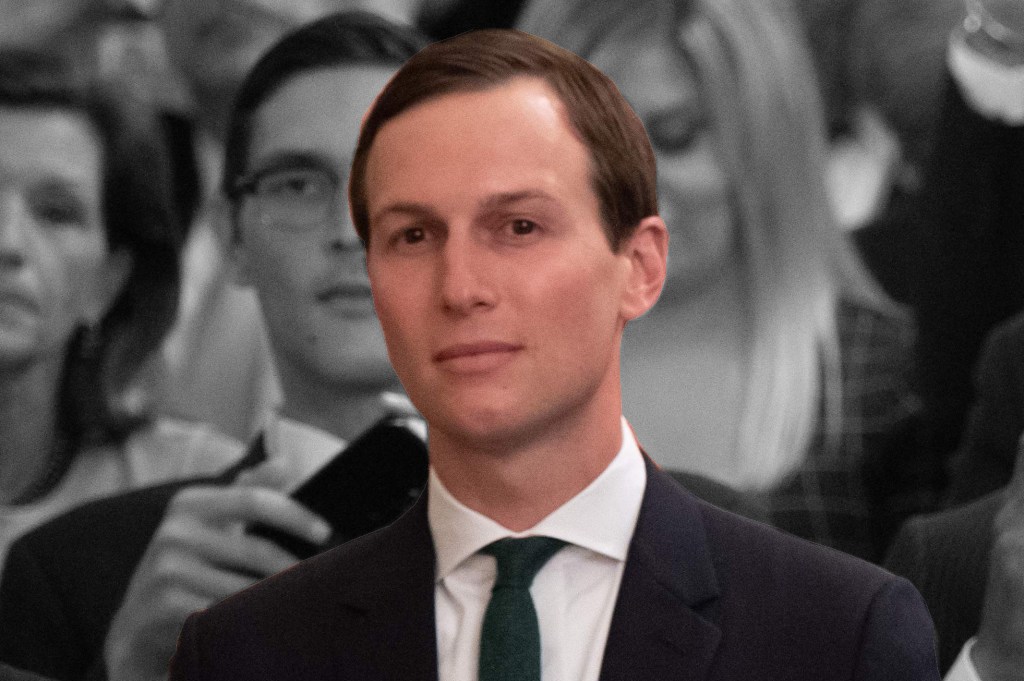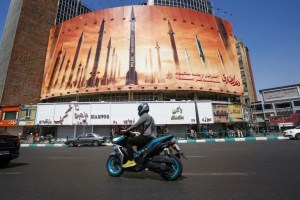Some people call Jared Kushner a real estate salesman, but that is to take him at his own valuation. He is the driver of the real estate salesman’s golf cart, or the over-eager youth with the over-sharp side parting who greets you in the hotel lobby with brochures offering competitively priced day trips. Last week, it was the rosy view from the non-existent penthouse of Trump Heights. This week, he’s back in his natural habitat, the hotel lobby of the Four Seasons, trying to sell timeshares in the property deal of the century.
Just as the real estate brochure sells the off-plan apartment with an artist’s mock-up of what it’ll look like, so Kushner offers a ‘different lens’ on the Israeli-Palestinian conflict — the vision of Peace to Prosperity. But, just as one shoddily built block of condos resembles another, this vision is unlikely to match up in reality. This is a bait and switch, with neither the bait nor the switch fully described.
The idea that political peace between Israeli and Palestinian would lead to economic prosperity was the conceit at the heart of the Oslo Accords. Reality blew up that conceit in 2000 with the Palestinian war of suicide bombings, along with the electoral future of the Israeli politicians who had promoted it. Declarations of amity and the signing of treaties led to war. The subsequent prosperity of the ever-booming Israeli economy, and its trickle-down effect on the economically dependent Palestinians in the West Bank, have happened despite the failure of peace, and not because of its success.
Since the petering out of the Second Intifada in 2005, prosperity, combined with constant co-ordination between Israeli and Palestinian security forces, has kept the peace in the West Bank. Since the Hamas takeover in Gaza in 2007, Gaza has spiraled into war and economic failure. So it’s not just that peace didn’t lead to prosperity. In the West Bank, prosperity has led to a quasi-peace, or at least an absence of war inside a high-tech security envelope.
Jared Kushner, being American, is a pragmatist. He surely sees that an absence of war is a distinct improvement on mutual slaughter. Benjamin Netanyahu, being a cynic as concerned with national security as his job security, is also a pragmatist. So are the Gulf monarchies. The keepers of the golden spigots are, like so many workers in this age of globalization, worried about their job security. The Palestinian leaders in Ramallah and Gaza are, in a rare display of unity, angry that all this pragmatism, and the coalescence of their Arab patrons in an anti-Iran alliance with Israel, is depriving them of their sole leverage, the threat of war.
More than a decade of non-war and economic growth have deepened the links between Jews and Arabs west of the Jordan River. The idea that this, combined with the absence of a political track, amounts to a ‘status quo’ is misleading. The deepening of economic links reflects geographical intimacy. As the geostrategic realtors of the British Empire recognized, the two peoples share the same political property.
But as the geostrategic realtors of the British Empire discovered, you cannot sell the same property to two parties. The more Jews and Arabs share the same political space and share in the same economy, the less possible the creation of separate political spaces becomes. It’s still possible for two peoples to fight, but it’s not possible to create two states, given the geographical and demographic terrain.
So the problem with Kushner’s pitch isn’t just that ‘Peace to Prosperity’ has it the wrong way round. It’s identifying what ‘Prosperity to Peace’ would really mean. What kind of prosperity is now being recognized as a fact on the ground? What kind of ‘peace’ might it lead to?
Kushner says that the ultimate goal of the ultimate deal is ‘an enduring and fair political solution to the conflict, one that guarantees Israel’s security and respects the dignity of the Palestinian people’. But a combination of factors — the rapid growth of the Israeli economy, the auto-destruction of the Palestinian national movement, the disintegration of Arab autocracies, the rise of Iran, the right-turn of disillusioned Israeli voters — mean that no Israeli government can risk creating a Palestinian state.
As often with the Trump administration, you feel they deserve two cheers, or even one, for acknowledging the reality that the foreign policy they’ve inherited is a catalog of expensive failures. As usual, the quality of the personnel changed with fixing it leaves something to be desired. Kushner is accused of being a glib Machiavelli, often with allusions to his Jewishness. But it’s just as possible that, like many spoilt, rich young Americans, he’s just a glib ignoramus.
Either way, his pitch for investment now and the ‘political issues’ later is both rational and irrational. Rational because it recognizes the success of Netanyahu’s policies of economic pacification, and irrational because it seems to expect that this ground-up economic strategy will ultimately revive the dead two-state concept at the political level.
It’s possible that investors in Kushner’s Bahrain pitch may make a profit from getting in on the ground floor, but they won’t be building up a Palestinian state. Prosperity, and the strange peace whose foundations it is laying, is the path to a single state in which two peoples claim political power — a condominium, as it’s called. More prosperity means that Jews and Arabs will get there faster. If they arrive at the permanent timeshare that Colonel Gaddafi called ‘Isratine’ without buffering by their own political institutions, the neighborhood might not be peaceful at all. Sooner or later, realty bites.
Dominic Green is Life & Arts Editor of Spectator USA.


















